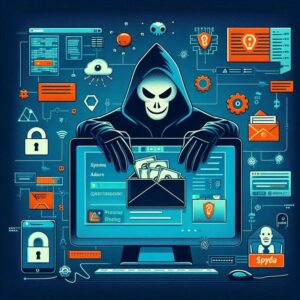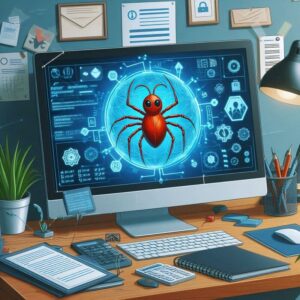Protect Your PC with a Virus Check
Performing regular virus scans is crucial for maintaining your computer’s security and optimal performance. Knowing the potential dangers of viruses, malware, and other harmful software is important. These malicious programs can cause issues such as system slowdowns and unauthorised access to sensitive data. Regularly scanning your computer for viruses can help you detect and remove potential threats before they cause significant damage.
Regular virus checks are crucial for protecting personal and financial information. Malicious software can extract your passwords, credit card details, and other confidential data, exposing you to the risks of identity theft and fraudulent activities. In addition, malicious software can lead to computer crashes and loss of productivity. Running regular virus scans is essential for safeguarding your computer and protecting sensitive information.
Performing regular virus checks is crucial for ensuring your computer’s security and optimal performance. Malware can significantly impact system performance, making routine activities more difficult. Regularly scanning your computer for viruses will ensure smooth and effective performance. This entails uninterrupted work, internet browsing, and a readily available computer. Performing regular virus scans on your PC is a straightforward yet powerful method to safeguard your data, keep your computer running smoothly, and steer clear of any security issues.

Central Points to Remember
- Regular PC virus checks are essential to ensure the security and performance of your computer.
- Malware poses a significant threat to your PC, including data theft, system damage, and privacy invasion.
- Performing a PC virus check involves using antivirus software to scan for and remove malicious programmes.
- Choosing the suitable antivirus software for your needs involves considering factors such as real-time protection, system impact, and additional features.
- Scheduling regular malware scans is crucial to maintaining the security of your PC and preventing potential threats.
- Additional steps for PC security include keeping your operating system and software updated, using strong passwords, and being cautious of suspicious emails and websites.
- If your PC is infected, disconnect from the internet, run a full virus scan, and seek professional help.
- Understanding Malware and Its Threat to Your PC
Malware refers to a wide range of harmful programs that aim to damage, disrupt, or interfere with an electronic system. These include various types of malicious software, such as viruses, worms, Trojans, ransomware, spyware, and adware. Every kind of malware poses a distinct threat to your computer’s security and functionality, as it each has its own specific objectives and methods of attack.
Viruses, or well-known malware, are designed to duplicate and propagate from one machine to another. They can create numerous problems, such as file deletion and identity theft. Worms can spread independently, which makes them highly hazardous, much like viruses. Nevertheless, Trojans, standing apart from the rest, disguise themselves as genuine software to trick users into installing them, ultimately giving cybercriminals the ability to access sensitive data or take control of the compromised computer.
Ransomware is a cunning virus that encrypts its victim’s files and demands payment to regain access. Programmes known as spyware and adware are designed to gather information about a user’s browsing habits and display unwanted advertisements. Just like a systems analyst, it is crucial to understand the possible risks to your computer caused by different types of malware and proactively take measures to safeguard against them.
How to Perform a PC Virus Check
Performing a PC virus scan is straightforward and can be easily accomplished with antivirus software. These days, every antivirus program comes equipped with real-time protection and regular scanning capabilities to swiftly identify and eliminate any pesky viruses lurking on your computer. Activate your antivirus software and initiate a comprehensive system scan to detect potential viruses. Initiate a thorough scan of all files and programs on your computer to detect any signs of malware.
Aside from conducting comprehensive system scans, numerous antivirus programs offer the option to perform quick or customised scans on individual files or folders. Fast scans are great for quickly checking for potential threats, while customised scans allow you to focus on specific areas of your computer that you suspect may be infected. Performing regular scans is essential for keeping your computer free from malware.
Antivirus software is essential for maintaining computer security, but it is important to remember that it is just one piece of the puzzle. It is crucial to regularly update your operating system and other applications with the latest security patches. Keeping your software up-to-date is essential for maintaining your computer’s security, as many malware attacks take advantage of vulnerabilities in outdated software. By implementing these precautions and conducting routine virus scans, you can protect your computer against potential security threats.

Choosing the Right Antivirus Software for Your Needs
When choosing antivirus software for your computer, several factors must be considered to ensure you find the most suitable programme for your requirements. One crucial factor to consider is the level of security offered by antivirus software. Seek a programme that provides robust real-time protection against malware, firewall, email, and online security features. These features are designed to provide an added layer of protection against malware, reducing the risk of your computer being compromised.
Usability is a crucial factor to consider when evaluating antivirus software. You can feel assured in your capability to install and utilise it, with an intuitive interface that enables you to perform virus scans and manage security settings effortlessly. Additionally, it is essential to assess the impact of antivirus software on the performance of your device. Consider selecting an antivirus programme that offers robust protection while maintaining optimal computer performance, as specific programs can be demanding and potentially slow down your system.
Take into account the reputation and track record of the antivirus software provider. Seek programmes from reputable organisations with a proven history of delivering reliable security solutions. You can make a well-informed decision regarding the most suitable antivirus software for your needs by utilising review sites and relying on reputable recommendations. By considering these factors and choosing the suitable antivirus software for your requirements, you can protect your computer against potential security threats.
Scheduling Regular Malware Scans
Make sure to regularly schedule malware scans to safeguard your computer against potential attacks and conduct manual virus checks. Many antivirus programs offer the option to schedule automatic scans regularly, such as daily, weekly, or monthly. By periodically scheduling scans, you can ensure your computer is constantly checked for malware without manually initiating them.
Make sure to schedule regular malware scans, especially for busy individuals who may not have the time to manually run virus checks on a regular basis. Setting up automatic scans provides security, as your computer is regularly checked for potential threats without additional effort. This can assist in keeping your PC secure and running smoothly without the need for constant supervision.
When considering your scheduled malware scans, your time flexibility must be kept in mind. This enables you to avoid any interruptions to your work or other engagements. For example, by scheduling scans during off-peak hours when your computer is idle, you can ensure they won’t disrupt your tasks. By regularly scanning your PC for security threats, you can ensure that your daily routine remains uninterrupted.
Additional Steps for PC Security
Aside from conducting routine virus checks and scheduling malware scans, you can take several additional measures to enhance your PO’s security. It is highly recommended that you implement two-factor authentication whenever possible and consistently use strong, unique passwords for all your online accounts. Even if your passwords are compromised, this can help protect against unauthorised access to your accounts.
It is essential to exercise caution when navigating the internet and downloading files or programs. Be wary of downloading files from sources you are not familiar with and of clicking on suspicious links that could potentially contain malware or other security threats. Stay vigilant against phishing attacks, where scammers trick you into revealing sensitive information through fake emails or websites.
Regularly backing up your essential files is crucial to ensuring PC security. Backups can be a lifesaver if your computer falls victim to malware or experiences a hardware failure. It’s always a good idea to be prepared and protect your essential data. To safeguard your files and regularly shield them from potential harm, use a cloud storage service or an external hard drive.
It is crucial to stay up-to-date on the latest security risks and best practices for PC security. Stay up-to-date on malware threats and security vulnerabilities, and proactively protect your PC. By implementing these extra measures for PC security, you can enhance your computer’s defence against potential threats.

What to Do If Your PC Is Infected
Even with all the necessary precautions, there is still a chance that your PC could be infected with malware. If you suspect your computer has been infected, there are steps you can take to resolve the problem and minimise the impact of the infection.
If you think your computer might be infected with viruses, the first step is to open your antivirus programme and perform a thorough system scan. If the scan detects any threats, follow the recommended actions provided by the antivirus program to either quarantine or remove the affected files. On certain occasions, it may be necessary to start your device in safe mode before running a scan to ensure the detection and removal of any malicious software.
If your antivirus software cannot eliminate the infection or your computer continues to exhibit signs of malware even after a scan, you should seek assistance from a professional IT support provider or a computer repair technician. With their expertise and advanced tools, they can effectively clean your computer and restore its security.
Enhancing your antivirus software and strengthening your security measures to address the current infection and prevent future infections effectively is essential. This can be done by updating your antivirus software, implementing additional security measures like changing passwords, and reviewing recent internet activity for any signs of unauthorised access.
It is essential to remember that conducting regular PC virus checks is not just a simple task but a crucial aspect of maintaining the security and efficiency of your computer. Having a solid grasp of the different types of malware and their potential risks will give you the knowledge and confidence to take proactive measures to safeguard yourself. You protect your computer by consistently running virus scans, setting up automatic malware scans, choosing the right antivirus programme, and taking extra security measures. If your computer gets infected despite these precautions, taking immediate action to address the virus and prevent future incidents is crucial. This will help minimise the damage to your machine’s security and performance.
FAQs
What is a PC virus check?
A PC virus check scans a computer system for potential viruses, malware, or other malicious software that may have infected it.
Why is it essential to perform a PC virus check?
Performing a PC virus check is essential to ensuring the security and integrity of your computer system. Viruses and malware can damage your files, steal personal information, and disrupt the normal functioning of your computer.
How often should I perform a PC virus check?
It is recommended to perform a PC virus check regularly, at least once a week, to ensure that your computer is protected from any new threats that may have emerged.
What are some signs that my computer may be infected with a virus?
Some signs that your computer may be infected with a virus include slow performance, frequent crashes, pop-up ads, unauthorised file changes, and unusual error messages.
What are some widespread PC virus-checking software programs?
Some widespread PC virus check software programmes include Norton Antivirus, McAfee, Avast, Kaspersky, and Bitdefender. These programs can scan your computer for viruses and malware and remove any threats that are found.
Are there any free PC virus check options available?
Several free PC virus check options are available, such as Windows Defender (built into Windows operating systems), Avast Free Antivirus, AVG Antivirus Free, and Malwarebytes. These programs offer basic virus scanning and removal capabilities at no cost.
References
Stay Safe Online: Tips for Preventing Ransomware on Your Dell Device—Ask. com. https://www.ask.com/news/stay-safe-online-tips-preventing-ransomware-dell-device
Beyond the Blue Screen of Death: Exploring Common Causes and Solutions for Computer Crashes and How to Prevent Them | 01. https://vocal.media/01/beyond-the-blue-screen-of-death-exploring-common-causes-and-solutions-for-computer-crashes-and-how-to-prevent-them
The post Protection Against Computer Viruses appeared first on Digital Agency Somerset.
The post Safeguarding Your Computer From Malware appeared first on Ai Ninja Toolbox.
The Article Safeguarding Your Computer From Malware Was Found On https://limitsofstrategy.com





Comments are closed